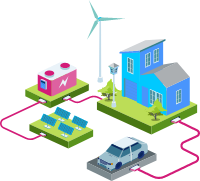Today, businesses not only play a crucial role in creating better social, economic and environmental value, but also in enhancing the quality of life for societies in the long term. To achieve this balance, private organisations, including Hitachi, must operate their businesses to align with the objective of resolving pertinent societal issues in these areas, especially in fast-growing regions such as Southeast Asia.

Improving People's Quality of Life

Inclusive Growth

Ecological Sustainability
Socio-economic growth depends heavily on communities having access to clean, affordable and sustainable energy. While energy is a driving force behind improving quality of life, many countries rely heavily on conventional energy production that is both carbon- and labour-intensive.
Hitachi thus aims to help societies generate clean energy from myriad sources, especially renewable energies. Our solutions provide more stable and sustainable power supplies that also produce less CO2 emissions, the latter of which is a fundamental part of the Hitachi Environmental Innovation 2050 plan. On this front, we are providing an energy storage solution for Singapore’s first Virtual Power Plant (VPP) project. Hitachi Energy’s* battery energy storage system is a key part of the VPP infrastructure, providing grid stability by balancing intermittent generation with smart and dynamic loads.


Diversity and inclusion are central in fostering broader-based societal progress. Hence, we have taken on the mandate to both promote and embody diversity and inclusion throughout our organisation.
This is reflected through our membership in ‘The Valuable 500’, an international movement to advocate active participation in business by persons with disabilities. This is in addition to our Fair Employment Pledge, which reflects our alignment with some of the best fair employment practices in the region, such as the Singapore Tripartite Alliance for Fair and Progressive Employment Practices’ (TAFEP) five key principles: merit-based recruitment, respecting employees, provision of fair opportunities, rewarding employees fairly and labour law compliance.
Through these efforts, Hitachi aims to grow both individuals and organisations by embracing this diversity throughout our business activities.
While industrial activities have long been synonymous with pollution, sustainable industrial development can still be achieved. Yet, this requires a concerted industry effort to develop more efficient, less energy-intensive sectors and services. Throughout our history, Hitachi has always sought to collaborate with a variety of key stakeholders that can enact this change.
For instance, Hitachi was selected as a system vendor for a ‘demand response’ demonstration project driven by the Electricity Generating Authority of Thailand. As renewable energy sources are subject to sudden changes in weather or other factors, this project will help to ensure a stabilised operating system that optimises power supply and demand balance, making greater reliance on renewable energy possible.
However, our efforts cannot just focus on creating cleaner environments; they must seek to promote greater societal inclusion in economic activities. For instance, innovating on financial services by focusing on universal accessibility and easy adoption can help to both improve people’s quality of life and power business growth.
 Enabling Financial Inclusion through easy-to-easy payment methods
Enabling Financial Inclusion through easy-to-easy payment methods
Cities are key drivers for growth as more people move to major urban hubs. However, the increased human activities also make cities prone to many environmental and social challenges.
Here, innovation and urban effective management are pivotal in making cities safer, more resilient and more inclusive for everyone living in them. Hitachi has been helping to support the development of ‘smart cities’ that can offer wide-ranging improvements in terms of the economy, the environment and society.
This includes our work in the smart development of a township located in one of Malaysia’s key metropolitan areas, where we leveraged our innovations to improve energy optimisation in the township’s buildings via a system that extracts and stores actionable data digitally. This provides a use case for how energy management can be conducted across various buildings in large townships, especially in Southeast Asia where its tropical climates mean buildings expend larger amounts of energy to keep their environments cool and comfortable.



Through our Social Innovations, Hitachi is leveraging our resources and global reach to improve societies. As people and businesses represent core societal components, we must drive these efforts with their cooperation.
For our part, we are showing just how our organisation is walking our talk in creating a more sustainable future. To note, Hitachi was selected as a constituent of the FTSE4Good Index Series and the FTSE Blossom Japan Index, which are among a growing number of indexes designed to measure the performance of companies demonstrating strong ESG (Environmental, Social, and Governance) practices. This further strengthens Hitachi’s commitment to continue developing and providing new solutions that apply technologies and best organisational practices to build a sustainable society.
The road ahead will be challenging, but it is a worthwhile path to walk on. Our organisation will continue championing environmental and social development efforts, as well as seek to clearly demonstrate the important role of private organisations in supporting the long-term development of societies.



*With effect from 13 October 2021, Hitachi ABB Power Grids Ltd is now known as Hitachi Energy Ltd.
Date of Release: January 2022